EUROPE
Launch of the 2014 OPEN DAYS
February 2014The 12th OPEN DAYS - the European Week of Regions and Cities - were launched on 10 January 2014.

The 12th OPEN DAYS - the European Week of Regions and Cities - were launched on 10 January 2014.

Final report – “Cross-Border Metropolitan Regions” (MORO IMeG project, Germany)
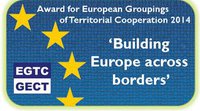
The Committee of the Regions launches a bi-annual European award named “Building Europe Across Borders” to recognise and give visibility to the best practice of a European Grouping of Territorial Cooperation (EGTC) related to the creation of growth and jobs in Europe (Europe 2020 Strategy).

On 16 January 2014 cross-border meetings took place in Maubeuge, organised by the Charleroi-Sud Hainaut region and the Communauté d’Agglomération Maubeuge-Val de Sambre (CAMVS) to reinforce their collaboration initiated in 2011.
The French-Belgian health monitoring unit (EEIG OFBS) and the Wallonia-Lorraine-Luxembourg cross-border health monitoring unit (EEIG LUXLORSAN) organised a conference on health systems and cross-border cooperation, which took place on 18 December 2013 at the Committee of the Regions offices.
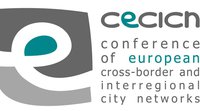
In the context of the 2014-2020 programming period, the CECICN1, of which the MOT is a member, in December 2013 officially submitted two contributions to the European Union’s DG REGIO and DG MARKT in order to prepare an upcoming meeting at European level.

“Build bridges between the States through the construction of development programmes that are going to join together the communities on either side of physical borders” was the objective of the conference on cross-border cooperation which took place on 17 to 19 December 2013 in Dakar, Senegal, under the aegis of the UEMOA1, attended by Aminata Touré, prime minister of Senegal, ministers from Mali, Burkina Faso, Niger, Benin and Guinea-Bissau, representatives of Côte d’Ivoire, Togo, the African Union and the ECOWAS, and many local elected representatives and experts.


In 2013, the MOT conducted a large-scale study aimed at defining the priority areas for the development of the French-Swiss Jura Arc. This cross-border territory encompasses the Franche-Comté Region and the Swiss cantons of Bern, the Jura, Neuchâtel and Vaud.
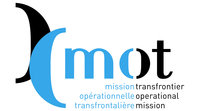
On 4 December, the MOT’s Chairman, Michel Delebarre*, and the MOT team took part in a hearing at the National Assembly conducted by Philip Cordery, Chairman of the parliamentary study group on cross-border cooperation, along with numerous French MPs for border areas.

Michel Charrat, Chairman of the Groupement transfrontalier européen (GTE, European Cross-Border Grouping), an association that defends the rights of cross-border workers along the French-Swiss border, replies to our questions.

On 20 November 2013, the European Parliament adopted a resolution on the new regulation relating to the EGTC. This regulation will help to clarify, simplify and improve the creation and functioning of EGTCs.
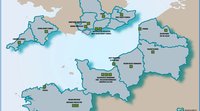
The final conference of the French-British project CAMIS (Channel Arc Manche Integrated Strategy) took place on 21 November 2013 in Rouen.
The MOT organized five information seminars in September and October 2013 on operational arrangements for cross-border projects on French borders. Each seminar covered one or two of the French borders. Consult the documentation.

The Mission Opérationnelle Transfrontalière and its president Michel Delebarre invite you to discover the new version of the MOT website: a unique resource centre for cross-border cooperation in Europe!

Organised by the Cross-Border Agency for the Development of the Basque Eurocity and the Donostia-San Sebastián City Hall on 14-15 November 2013 in San Sebastián, this event brought together the political, technical, institutional and socio-economic representatives of the Basque Eurocity.

The seminar on legal instruments for cross-border projects organised by the MOT on 29 October 2013 in Lille (at the Nord-Pas de Calais Conseil Régional) brought together nearly 70 French, Belgian and English players involved in cross-border cooperation.
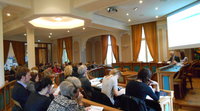
Over 50 practitioners participated in the seminar on the legal instruments for cross-border projects organised by the MOT on 17 October 2013 in Sarreguemines and hosted by the Communauté d’Agglomération Sarreguemines Confluences (Sarreguemines Confluences Agglomeration Community).

The Parc Naturel Régional Scarpe-Escaut (France) and the Parc Naturel des Plaines de l’Escaut (Belgium), which together form the Hainaut Cross-border Nature Park, received the “Transboundary Park” certificate at the closing ceremony of the annual conference of the EUROPARC Federation on 12 October 2013 in Hungary.
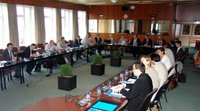
The Budapest Platform organised a seminar on 2 July at the Union Benelux headquarters in Brussels on the role of the national level in supporting cross-border cooperation.

It is with great sadness that we have learned of the death of Pierre Mauroy. He was a major architect of decentralisation, of the construction of Europe and of cross-border cooperation. He was also a great president for the Mission Opérationnelle Transfrontalière from 2001 to 2008, and subsequently continued to provide guidance for it as honorary president. We were honoured to work with him. A major figure has left us.
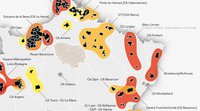
The Réseau des Pôles Métropolitains (metropolitan hubs network), the MOT, DATAR and the FNAU held a seminar on this topic on 19 March 2013.
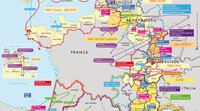
The MOT produced a map summarising the main cross-border agreements, structures and programmes on French borders.

The MOT activity report for 2012, available (in French) by clicking here, reports on intense activity, both at operational level, with studies and tasks in the field and many services to members, and at national and European levels, with support for the definition of a cross-border policy in France, preparation of the 2014-2020 cohesion policy, and European contributions for ensuring better consideration of cross-border territories.

In a dynamic context of reform - redefinition of cross-border policy and decentralisation process in France, preparation of the 2014-2020 programmes at European level - the MOT has produced a methodological guidebook aimed at improving articulation between cohesion policy, governance structures and cross-border territorial approaches.